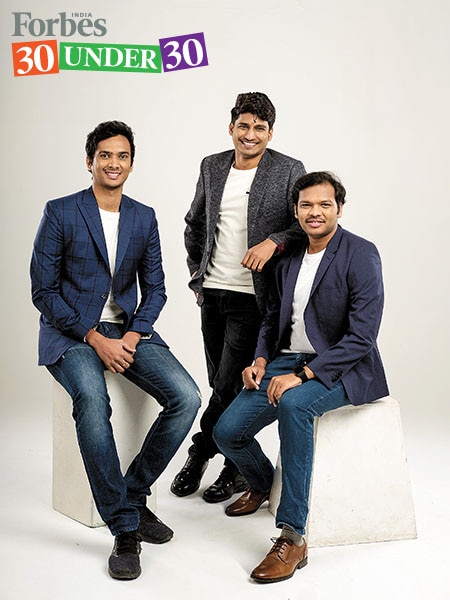
Rapido: Accelerated growth for the motorcycle taxi startup
Rapido's motorcycle taxis, now available in 100 cities across the country, has helped it scale 40x in the past year
 (From left) Aravind Sanka, Pavan Guntupalli and SR Rishikesh founded Rapido in 2015
(From left) Aravind Sanka, Pavan Guntupalli and SR Rishikesh founded Rapido in 2015Image: Nishant Ratnakar for Forbes India
Aravind Sanka | 28
Pavan Guntupalli | 28
SR Rishikesh | 27
Co-founders, Rapido
In 2015, when ridesharing companies were taking off across the world, in India it remained restricted to taxis. A group of IITians identified a gap in the Indian market—motorcycle taxis—and began what is now one of the most sought-after startups in India: Rapido.
Aravind Sanka, Pavan Guntupalli, and SR Rishikesh had initially teamed up to start a logistics startup, TheKarrier, only to realise that the two-wheeler ridesharing market had a lot more potential. “We wanted to start something that was for the masses, and saw this huge opportunity,” says Sanka, co-founder.
But entering a nascent market came with its challenges. The biggest being the perception of two-wheelers as unsafe modes of travel. “We managed to convince our insurance partner to come up with a policy that would provide insurance for both riders and customers. So all our trips have been 100 percent insured,” says Sanka who is now looking at pumping in about ₹200 crore on marketing. In the last two years, the company has grown 10x a year, and has expanded to 100 cities.
For a company that survived the first three years without any investment simply because, as Sanka says, “investors never thought bike taxis would take off in India”, Rapido now has a total funding of $75 million from investors like Westbridge Capital, Nexus Venture Partners and Integrated Capital. “We are very impressed with the execution capabilities of Rapido as they have scaled 40x in the past one year. This service is an outcome of a market necessity and will see more adoption in the future,” says Sumir Chadha, co-founder and managing director, WestBridge Capital.
See the full Forbes India 30 Under 30 list for 2020 here
“We have launched an initiative in Chennai for differently-abled riders, where we have specialised vehicles for them. We started off with 50 riders, and today have more than 200,” he adds. Rapido has tied up with eBikeGo, a two-wheeler rental platform, to electrify about 10 percent of its fleet. “The biggest challenge for electric vehicles is the technology shift. There is no proven vehicle, battery and charging infrastructure. It’s going to take time but we need to start somewhere,” says Sanka.

(This story appears in the 30 November, -0001 issue of Forbes India. To visit our Archives, click here.)








